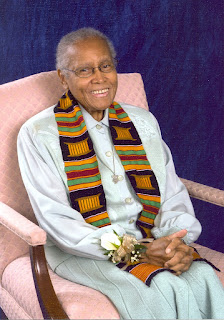We don’t often hear of religious who are Black, and especially those who marched alongside Martin Luther King, Jr. in
SISTER MARY ANTONA EBOwas an American hospital administrator, civil rights activist and Franciscan Sister of Mary. in
She was born Elizabeth Louise "Betty Lou" Ebo was born in Bloomington, Illinois, in 1924, the daughter of Daniel Ebo and Louise Teal Ebo. She lived at the McLean County Home for Colored Children with her two older siblings from 1930 to 1942, after her mother's death and her father's unemployment during the Great Depression.
She was hospitalized for long periods of her childhood, once for an infected thumb requiring amputation, and later with tuberculosis.
In 1944, she was the first black student to graduate from Holy Trinity High School. She converted to Roman Catholicism in 1942, and trained as a nurse the St. Mary's (Colored) Infirmary School of Nursing in St. Louis.
As a Catholic nun, she pursued further education, earning a bachelor's degree in medical record library science from Saint Louis University in 1962, and two master's degrees, one in hospital executive development (1970) from Saint Louis University, and one in theology of health care (1978) from Aquinas Institute of Theology. From 1979, she held a chaplain's certificate from the National Association of Catholic Chaplains.
She was one of the first three black women to join the Sisters of St. Mary in 1946, and became Sister Mary Antona when she took her final vows in 1954. She worked in medical records at Firmin Desloge Hospital from 1955 to 1961,[ and was director of medical records at St. Mary's Infirmary from 1962 to 1967.
In 1967, she was named executive director of St. Clare's Hospital in Baraboo, Wisconsin, the first African-American woman to be head of an American Catholic hospital. In 1974 she was named executive director of the Wisconsin Conference of Catholic Hospitals.[ She worked at Catholic hospitals in Madison, Wisconsin, and at the University of Mississippi Medical Center. From 1992 to 2008, she was a pastoral associate at St. Nicholas Church in
With encouragement from her mother superior, Sister Mary Antona and five other nuns joined the Martin Luther King's march in
Her presence, along with that of the other sisters, was deeply encouraging to the marchers. Andrew Young, a civil-rights leader who would one day be famous in public service, told the marchers upon the sisters’ arrival at the staging spot of Brown A.M.E. Chapel, in
Her story was included in the documentary Sisters of Selma: Bearing Witness for Change (2007).
In 1968, Sister was a founder of the National Black Sisters' Conference, and president of the conference from 1980 to 1982. In 1989, she received the conference's Harriet Tubman Award for service and leadership. She served on the Human Rights Commission of the Archdiocese of St. Louis, and was a member of the Missouri Catholic Conference on Social Concerns.
In 1999, she received the Eucharist from Pope John Paul II, in a group of congregants including Rosa Parks, when the pontiff visited
Sister Mary Antona Ebo died in 2017, aged 93, at the Sarah Community, a retirement home in Bridgeton, Missouri, after 71 years in religious life.
Sister Antona Ebo has left a lasting impact on social justice and civil rights as a whole, especially i to African-American society and to the Church..



